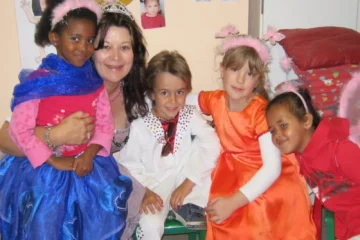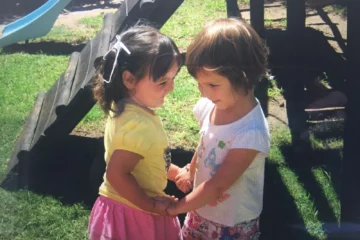When I started teaching children 20 years ago, I never gave it a thought that I would
teach 2 different generations in that time. The best is that I noticed a difference in the
classroom but did not know at the time what it was.
In 2017 I found the answer. I was invited to listen to a presentation on generations and how they define us. I decided to do some research into generations and found it very interesting. Today I will be sharing my research with you.
All about Generations:
Generations are defined as a group of people born in the same period and generation names exemplify our human tendency to categorise ourselves.
Historians generally agree that generational naming began in the 20th century. An
American writer Gertrude Stein wrote about “The Lost Generation” in her book. She gave this title to people born at the turn of the 20th century who devoted their lives to service during World War I.
Generational theorists Neil Howe and William Strauss are credited with identifying and naming U.S. 20th century generations in their 1991 book titled “Generations”. The names of the generations have stuck but the dates that define them are flexible.
“Generation Titles” by Neil Howe and William Strauss:
Here is how Howe and Strauss categorised generations.
1900 to 1924 The Greatest Generation (also known as GI generation)
1925 to 1945 The Traditionalists (also known as the Silent generation)
1946 to 1964 The Baby Boomers
1965 to 1979 Generation X ( also known as the Thirteeners)
1980 to 1996 Millennials (also known as Generation Y)
1997 to 2011 Centennials (Generation Z the new silent generation)
2012 to 2024 Generation Alpha
How Generations Define us:
Knowing the dates and events that define each generation can help us all understand a bit more about ourselves, as parents and our children. Generations take on special meaning because their members tend to experience critical life events and transitions at particular historical moments and these moments define their lives.
The Greatest Generation: 1900 to 1924:
This generation survived the Great Depression and then went off to fight WWI. Parents raising a family at this time put a premium on traits like hard work and grit.
The Traditionalists (Silent Generation): 1925 to 1945:
This generation famously got their name for being so conformist that they were silent through the McCarthy era when the fear of communism swept the country. They were too accepting of the government rather than speaking out against it. Their lack of protest gave way to them pursuing general modest careers and secure domestic lives.
The parenting style of the day was similar to that of their parents. Children were expected to earn their way through life using strong work ethics.
The Baby Boomers: 1946 to 1964:
Boomers are so named, because after their parents came home from WWII the American population exploded (boomed). Baby Boomers defied their parents and protested the Vietnam war and created the summer of love.
Baby Boomers notably redefined parenting by being the first generation to look at their children’s perspective of growing up and they started the concept of having family meetings. They are characterised by national optimism and prosperous consumerism.
Generation X: 1965 to 1980:
This generation is often referred to as the baby busters as the birth rate was much smaller than the boomers. This generation is characterised by reactions, rebellion, self-reliance and overall mistrust of institutional authority.
Dismissed as the slacker generation, generation X lived through the Aids pandemic, shifting culture landscape that would give rise to LGBTQ and rights.
Generation X parents tend to be more involved with their children’s Social and Educational development.
Millennials (Generation Y): 1981 to 1996:
They lived through the 9/11 fight against terrorism, the start of the internet which plays a significant role in their personal lives. Boomers think Millennials are self-centred and entitled due to their excessive use of technology. They are community orientated and environmentally conscious. This is carried over to their children.
This group of parents are seen as open-minded, diverse families, freedom of expression which allows them to explore and create without structure and supervision.
Centennials (Gen Z): 1997 to 2011:
This generation is the first generation to grow up with technology. They are constantly
connected to their devices; be it phones, tablets or screens. They are also known to be the most depressed generation of our times.
Generation Alpha: 2012 to 2024:
This generation has never known life without social media. They are more tech-savvy than any other generation. This is a powerful tool that can change humanity in a myriad of positive ways. This will shape our culture and perceptions of who we are.
Teaching Centennials and Alphas:
During my 20 years of teaching, the parents of the Centennials and Alphas have mostly been Generation X and Millennials. Parents today have to contend with social media and the internet that gives them huge amounts of information on different topics. It is, therefore, more challenging for them to decide what is the best direction to take and this can be overwhelming, to say the least.
What I have observed whilst teaching the Centennials.
They focused on a willingness to learn and ask questions, listen to stories and go out and use their imagination to play and have fun. They were creative at heart and would build huge masterpieces in the sandpit.
They connected easily with one another. At Bella Bee Playschool we have a small group setting and it’s like being in a big family and they liked that. Technology was around but not the main priority at this age. They were an inspiring and interesting group of children to teach.
What I have observed whilst teaching the Alphas.
They are all about technology, it is a priority. They have smartphones, play stations and iPads which are a big part of their lives. If they don’t know anything they tell you to Google it and find out. They tell you they know everything and feel confident that they do. They are eager to learn. They love stories being read to them or a story being told. They love to pose for photos. They are very aware of nature and animals. They care about the earth. They enjoy communicating. They are an amazing group of children full of ideas and ready to express them daily. Although technology is a great tool and has opened up many avenues and has many advantages for children it has affected children in another way too.
The children’s imagination has reduced noticeably now as devices entertain them. It has become the “go to” solution. Children are more emotionally sensitive, tend to be more fearful and less independent.
Potty training takes much longer to master. Milestones are often delayed. Constant change and instant gratification have led to less routine and consistency. The concept of process and how long it may take is being lost. This causes impatience in these children.
Technology has caused fewer questions to be asked and less curiosity as Google is relied on. Abilities and skills are often a challenge as now everything is done for these children instead of them learning to do it themselves.
As a teacher, it has been helpful to understand generations. I have been able to make the necessary adjustments to how I teach this group of children and relate to them. It is a joy for me to share my childhood stories and how life was in the past with them. It is wonderful to keep truths and values alive for this generation and hopefully, they will one day pass it on to their children and others as they journey through life. May God’s love and truth always be our centre and guiding light.


